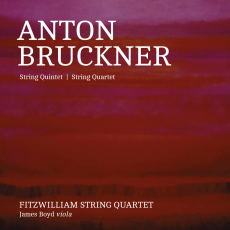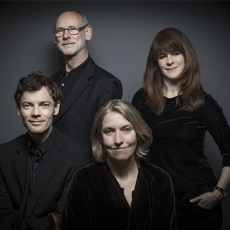Fitzwilliam String Quartet - Bruckner: Quintet & Quartet - The Bruckner Journal
A LOT of thought has gone into this recording - and it shows. Violinist Lucy Russell has chosen the CD booklet cover, a deep, dark red, rather Rothko-esque painting by Lee Campbell, and in a note she comments on a perceived similarity of the artist's and the composer's vision: "There is something about Bruckner's music that inspires a sense of unravelling space and time, of perspectives and horizons, of stillness and space. ... Both Campbell and Bruckner, through their shared potent use of colour and shape, are suggestive of the unreachable middle distance or horizon..."
In the booklet there is also a very rewarding essay by viola player Alan George, An approach to performing Bruckner's chamber works. Commenting on the insularity that can afflict string quartets, ‘with a repertoire so vast as to be entirely self-sufficient,' he observes that nevertheless no ensemble could give a faithful account of Verdi's quartet with no knowledge of Aida or Falstaff , nor of Sibelius's without a thorough acquaintance with his symphonies 3, 4 and 6. And for Bruckner, ‘by 1879 he had produced a chamber composition that can only realistically be studied in the context of his own surrounding symphonies, the tremendous Fifth, and the more congenial Sixth and Seventh...' Other ensembles who have performed Bruckner's chamber music often give little indication in their interpretations that they are aware of this context, but would rather situate the music solely in the line of Haydn, Mozart, Beethoven and Schubert chamber works - where, of course, it is worthy to take its place, but gains immeasurably from the wider and deeper understanding of its eloquence that arises from absorbing the particular drama, timescale, vision and intensity of the adjacent symphonies.
Much else in Alan George's essay testifies to the seriousness and scholarship which the Fitzwilliams have applied to the preparation of this work, including seeking out a set of strings from Dan Larsen in Minnesota, hand-wound gut strings that copy those that were in use in Vienna in the 1870s. "To a significant degree, they dictate to the player what can and cannot be done with the bow: the sound has to be ‘coaxed' from them rather than forced."
This coaxing has been rewarded by a performance that sounds absolutely wonderful. From the start there is a warmth and congeniality to the playing that is instantly attractive, something that is reproduced excellently in the recorded sound: it has great presence but is never harsh. When the CD first arrived I put it on, just out of curiosity, to hear a taster until I had time enough to do it justice - but 40 minutes later when I should have been elsewhere doing other things, I was still listening until the quintet performance ended: it was impossible to turn off. The deeply felt lyrical passages with which this music abounds, in this performance should melt the stoniest of hearts, and the dance-inflected rhythms, such as the second part of the opening theme, the passage with all the trills, and those in the Scherzo and Trio, are all given with an irresistible lilt. This characterful and nicely accented playing ensures that fairly measured tempos for the Scherzo and the Finale never lack strength or impetus, and communicates the joyful, very human side of the music.
The Fitzwilliams employ an always well-judged and expressive flexibility of tempo, especially in the transitions between themes and sections, allowing the music to die away reluctantly, but ushering in the next theme with a warm sense of new life. The Adagio avoids the very slow self-conscious religiosity that knowledge of Bruckner orchestral performance might have led to, but is in no measure short of profound and deeply moving musical utterance. Of the music in the second part of the Adagio main theme, the descending dotted rhythmic phrase on the violin, taken up by a sighing second viola (music that was maybe at the back of Schönberg's mind when he wrote Veklärte Nacht), Prof. William Carragan writes, ‘Listeners can here expect to sense the deepest revelation of Bruckner's emotions, and his resigned, ecstatic relation to the sublime.' Listeners with such expectations will not be disappointed with the Fitzwilliams' heartfelt performance.
In comparison with two other recordings that have almost the same programme - The Fine Arts Quartet on Naxos and L'Archibudelli on Sony - the Fitzwilliams score by playing the Intermezzo, the movement that Bruckner wrote as a substitute for the Scherzo, as a full movement with Trio and da capo, whereas the others give you only the unrepeated first part. It's well worth hearing the whole movement given its full structure and duration, and it's beautifully played on this new recording. On the other hand, the Naxos and Sony recordings include the Rondo for String Quartet, an alternative (though quite similar) and longer finale to the string quartet, for which there would not have been adequate time on the Linn recording. In terms of performance, somehow the Fine Arts Quartet are just not very interesting. L'Archibudelli on the other hand, also playing on gut strings, give a very fine, though rather straight performance of the Quintet. They don't have quite the humanity and warmth, nor the lilt, of the Fitzwilliams, but they have a security and forceful energy, especially in the finale, which leads to a fine performance of a different character to that of the Fitzwilliams. I wouldn't wish to be without either of them.
The string quartet receives a splendid performance. I was particularly taken by the first movement, the opening violin solo and the quartet's reply filled with a solitary, melancholy vision, the busy development a searching response, the whole movement seeming worthy to rank unashamedly amongst the mainstream 19th century repertoire. The Andante receives a tender, beguiling performance, the Scherzo and Rondo sprightly and full of attractive invention. It may have been only a ‘study work', but the Fitzwilliams' advocacy has a warm-hearted generosity that presents the work very effectively on its own merits without reservation.
The CD is a wonderful demonstration of how a thoughtful and knowledgeable approach need not sound studied or impoverished, but with musicians like these can blossom into a performance of authority, enchanting imagination and visionary eloquence.

